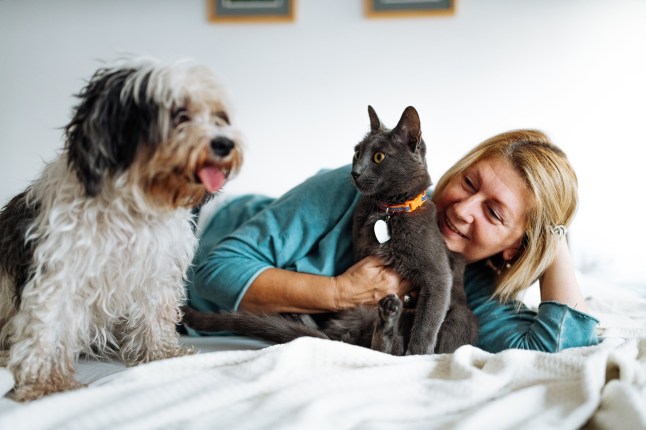Owning dogs cuts risk of dementia by 40% – having cats makes no difference


We all know the value of our pets, but did you know they could actually reduce the risk of developing dementia?
In fat, one study found dog owners were 40% less likely to get the disease, rising to 60% among those who were socially or physically active.
The same, however, cannot be said for cats.
A study of 7,500 adults in the UK compared those who lived alone to those who live with others.
After taking part in memory, verbal and thought tests eight years apart, they concluded that those living alone with a cat or dog experienced slower cognitive decline.
There was no significant difference for people who lived with others, indicating that pet companionship may help offset the cognitive risks of social isolation.

Can caring for a pet help people with dementia?
According to Alzheimer’s Society, people with dementia can experience an improvement in their self-esteem or confidence when they have a pet and can also improve quality of life and independence.
Looking after a pet may help those with dementia stay more engaged and involved if they are having trouble communicating with others.
Animals can also be a source of love and laughter for those who have dementia.
But the charity says there are a number of things to consider if somebody with dementia is looking to get a pet.
Does the person have the mental capacity to decide if they want a pet – This is to make sure there is a level of understanding about the responsibility and commitment involved.
Will the person be able to meet the needs of the pet – This includes the ability to feed and hydrate their pets, take them out for exercise, to the vets, and clean them.
Where to get a pet from – Some breeders, rescue centres or pet shops may refuse to sell a pet to somebody who has dementia.
The feelings of the person with dementia – Not everybody with dementia will want a pet so individuals needs will have to be considered.
Would the person benefit from semi-interactions with a pet instead – This could be in the form of animal visits rather than owning one.
Would a robotic pet or cuddly toy help instead – Some people with dementia benefit from robotic pets or teddy bears. This is because a fake pet can create many of the same calming qualities associated with a real pet.
Anecdotally, a woman told us in 2020 about her father’s wish to have a cat again before he died.
Cheryl Yates gave her dad Robert Wyatt, 88, a robotic cat in the last two weeks before he died and recounted the joy it brought him.
She said: ‘He was so happy to have a kitty again. He believed it was real and named his kitty Buddy right away.
‘This cat gave him so much comfort and joy and companionship.
‘He never let go of Buddy. It was always in his bed with him purring away and meowing when anyone talked.
‘I happened to see another patient with one of the kitties on his lap and I thought the cat was real – it was meowing and purring and blinking its eyes like a real cat.
‘The man just loved the kitty, so I asked about the cat and made sure to get one for my dad for Christmas
‘The kitties are for seniors with dementia and Alzheimer’s and they are incredible.’
Get in touch with our news team by emailing us at webnews@metro.co.uk.
For more stories like this, check our news page.